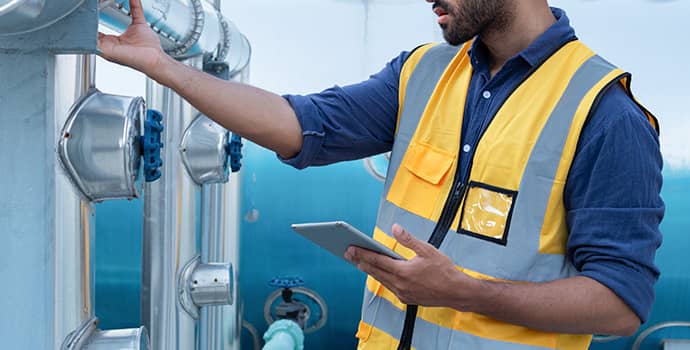In modern water treatment systems, data logging plays a critical role in performance tracking, troubleshooting, regulatory compliance, and predictive maintenance. By continuously recording flow rates, pressure levels, TDS, pH, conductivity, and system alarms, operators can monitor trends, detect anomalies, and optimize efficiency.
At Aqua Components LLC, we integrate advanced data logging solutions into our water treatment systems, allowing businesses to track operational parameters in real time, store historical data, and generate reports for analysis and compliance audits.
This guide explores the importance of data logging, how it works, and the benefits of automated logging systems in industrial, municipal, and commercial water treatment applications.
Why Data Logging is Essential in Water Treatment Systems
✅ 1. Ensures Consistent Water Quality
✔ Tracks TDS, pH, conductivity, and chemical dosing levels to ensure compliance with water quality standards.
✔ Identifies fluctuations that may indicate contamination risks or equipment malfunctions.
✅ 2. Optimizes System Performance & Efficiency
✔ Helps operators analyze pressure drops, flow variations, and membrane performance over time.
✔ Reduces energy and chemical consumption by identifying inefficiencies.
✅ 3. Supports Predictive Maintenance & Troubleshooting
✔ Detects trends in sensor readings that could indicate upcoming failures.
✔ Helps in scheduling preventive maintenance before breakdowns occur.
✅ 4. Ensures Regulatory Compliance & Record-Keeping
✔ Provides a detailed history of system performance and operational logs.
✔ Meets compliance standards set by EPA, WHO, NSF, and local environmental agencies.
How Data Logging Works in Water Treatment Systems
🔹 1. Real-Time Sensor Data Collection
✔ Sensors continuously monitor flow rate, pressure, TDS, pH, ORP, conductivity, and chemical dosing levels.
✔ Each reading is timestamped and stored in a centralized database.
🔹 2. Automated Data Storage & Retrieval
✔ Data is saved on local storage (SD card, PLC memory) or cloud-based platforms.
✔ Operators can access logs via HMI displays, mobile apps, or web-based dashboards.
🔹 3. Alarm & Event Logging
✔ Records warnings and alarms, tracking when they were triggered and resolved.
✔ Provides a timeline of system issues for root cause analysis.
🔹 4. Performance Analysis & Reporting
✔ Generates real-time charts, graphs, and performance summaries.
✔ Can be exported as PDF, Excel, or CSV files for regulatory audits.
📞 Looking for an advanced data logging solution? Contact us today!
Types of Data Logging in Water Treatment Systems
1. Local Data Logging (On-Site Storage)
✔ Stores data within the control panel, PLC, or HMI screen.
✔ Ideal for small to mid-size water treatment plants.
✔ Requires manual data export for analysis.
2. Cloud-Based Data Logging & IoT Integration
✔ Automatically transmits data to a cloud platform for remote access.
✔ Provides real-time monitoring via mobile or web dashboards.
✔ Enables automated alarms and predictive analytics.
3. Hybrid Data Logging (Local + Remote Storage)
✔ Stores critical data locally while syncing important logs to the cloud.
✔ Ensures data backup in case of internet outages.
Applications of Data Logging in Water Treatment
🔹 1. Industrial Reverse Osmosis (RO) Systems
✔ Monitors membrane efficiency and pressure drop trends.
✔ Tracks TDS and conductivity to ensure purified water quality.
🔹 2. Municipal & Wastewater Treatment Plants
✔ Records influent and effluent water quality metrics.
✔ Provides compliance logs for EPA and local water authorities.
🔹 3. Commercial Water Filtration Systems
✔ Tracks flow rates, pump cycles, and filter replacements.
✔ Generates reports for service and maintenance schedules.
The Benefits of Smart Data Logging Systems
✅ 1. Improves System Efficiency & Energy Savings
✔ Detects patterns in water usage to optimize performance.
✅ 2. Reduces Downtime with Predictive Maintenance
✔ Identifies early warning signs of filter clogging, pressure loss, or scaling.
✅ 3. Provides Real-Time Alerts & Notifications
✔ Instantly alerts operators if parameters exceed thresholds.
✅ 4. Supports Regulatory Compliance & Reporting
✔ Simplifies record-keeping for audits and inspections.
📞 Need a custom data logging solution? Talk to our experts today!
FAQs About Data Logging in Water Treatment Systems
Q1: How long can data logs be stored?
✅ Storage duration depends on system capacity. Cloud-based platforms offer long-term storage, while local storage may require periodic data exports.
Q2: Can I access data logs remotely?
✅ Yes! IoT-enabled data logging allows remote access from mobile or desktop applications.
Q3: How does data logging help with preventive maintenance?
✅ By tracking pressure drops, flow fluctuations, and chemical dosing trends, operators can detect early signs of system inefficiencies and prevent failures.
📞 Have more questions? Contact us for expert guidance!
Conclusion
A comprehensive data logging system is key to optimizing performance, ensuring compliance, and preventing costly failures in water treatment applications. Whether you operate an industrial RO plant, municipal wastewater facility, or commercial filtration system, automated data tracking enhances operational reliability and efficiency.
💡 Key Takeaways:
✔ Data logging improves water treatment system efficiency and maintenance planning.
✔ Real-time monitoring enables proactive troubleshooting and cost savings.
✔ Cloud-based solutions offer remote access, alerts, and compliance reporting.
✔ Historical data tracking supports regulatory audits and process optimization.
📞 Contact Aqua Components LLC today for custom data logging and water treatment monitoring solutions!

